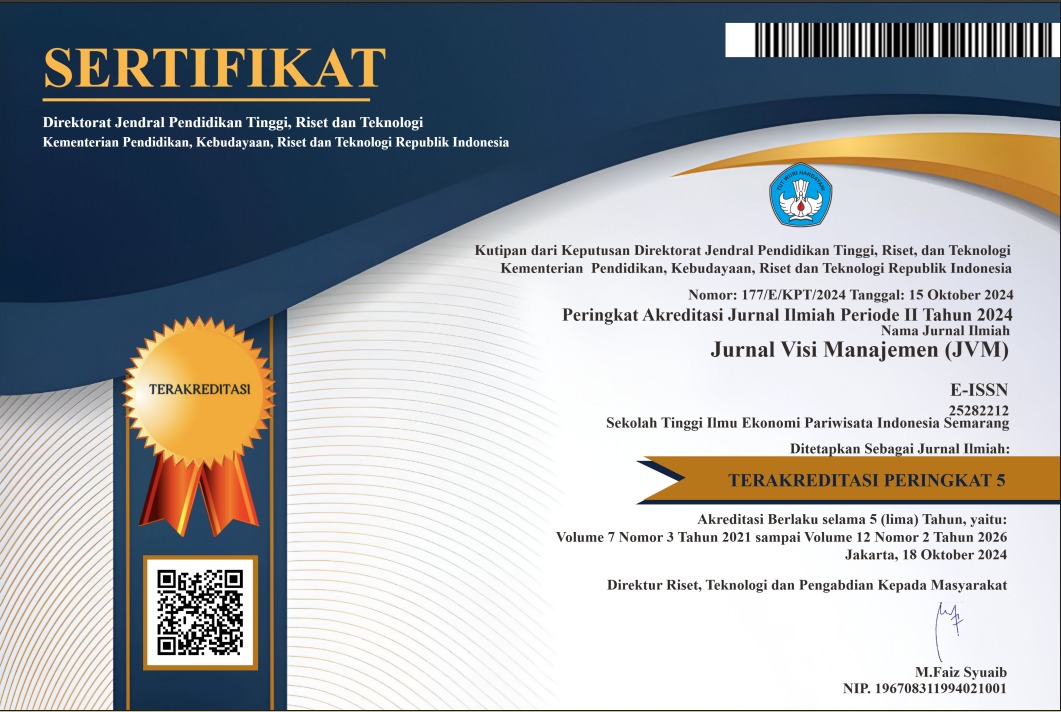Mendorong Keunggulan Bersaing melalui Integrasi Strategi Bisnis Hijau dan Pemasaran Berkelanjutan: Studi pada UMKM Fesyen di Kabupaten Banyumas
DOI:
https://doi.org/10.56910/jvm.v11i2.766Keywords:
Competitive Advantage, Fashion MSMEs, Green Business Strategy, Sustainable Management, Sustainable MarketingAbstract
The increasing international awareness of environmental issues has had a significant impact on business orientation in various sectors, including micro, small, and medium enterprises (MSMEs). In the fashion industry, MSMEs are not only required to create innovations in product design and quality, but are also directed to adopt environmentally friendly practices that support sustainability throughout their business processes, from production to marketing. This study aims to examine in depth how the integration of green business strategies and sustainable marketing contributes to increasing the competitive advantage of fashion MSMEs in Banyumas Regency, Indonesia. This study uses a quantitative approach with a survey method involving 100 fashion MSME respondents selected based on relevant criteria. Data processing was carried out through multiple linear regression analysis accompanied by classical assumption tests with the help of SPSS software, so that the research results have a strong empirical basis. The research findings indicate a positive and significant influence, both partially and simultaneously, between the implementation of green business strategies and sustainable marketing on achieving competitive advantage. The coefficient of determination (R²) value of 0.52 indicates that the two independent variables are able to explain more than half of the variation in competitive advantage possessed by MSMEs. The implications of these results confirm that the success of MSMEs no longer depends solely on product innovation, but also on the ability to integrate sustainability aspects into internal practices and external strategies. This research enriches the literature on sustainable management, particularly in the context of MSMEs in non-urban areas, while also providing practical input for the formulation of business assistance policies that are adaptive to market dynamics and increasingly complex environmental challenges. This research provides theoretical contributions to the literature on sustainable management in the context of MSMEs in non-urban areas, as well as practical implications for the development of business assistance policies that are more adaptive to environmental challenges.
References
Abdou, Y. A., & Ammar, N. (2024). Hands-on sustainability: Designing an engaging undergraduate sustainable business course. International Journal of Sustainability in Higher Education, 26(2), 278–294. https://doi.org/10.1108/IJSHE-07-2023-0300
Afriyeni, A., Rinesia, R. V., & Hamid, A. (2023). Analisis penggunaan teknologi informasi, inovasi produk, dan orientasi pasar terhadap keunggulan bersaing UMKM sektor kuliner Kota Padang. Mabsya Jurnal Manajemen Bisnis Syariah, 6(1), 115–126. https://doi.org/10.24090/mabsya.v6i1.10895
Afum, E., Agyabeng-Mensah, Y., Baah, C., Asamoah, G., & Kusi, L. Y. (2022). Eco-market orientation in the logistics industry: A conveyor belt for achieving organizational outcomes via green logistics practices. The International Journal of Logistics Management, 33(2), 712–734. https://doi.org/10.1108/IJLM-07-2021-0383
Alneyadi, A. (2023). Total quality management for competitive advantage in the UAE. European Journal of Business and Strategic Management, 8(2), 33–47. https://doi.org/10.47604/ejbsm.1974
Asbullah, M., & Tarigan, B. A. (2024). Sustainability practices in small business ventures: Assessing the integration of environmental and social responsibility in entrepreneurial ventures. International Journal of Business Law and Education, 5(2), 1609–1619. https://doi.org/10.56442/ijble.v5i2.683
Atasever, M. (2023). The impact of managerial sustainability and ethics on corporate success. Journal of Corporate Governance Insurance and Risk Management, 10(2), 176–185. https://doi.org/10.56578/jcgirm100207
Bag, S., Srivastava, G., Gupta, S., & Saito, T. (2022). Diffusion of big data analytics innovation in managing natural resources in the African mining industry. Journal of Global Information Management, 30(6), 1–21. https://doi.org/10.4018/JGIM.297074
Barakat, B., Milhem, M., Naji, G. M. A., Alzoraiki, M., Muda, H., Ateeq, A., & Abro, Z. (2023). Assessing the impact of green training on sustainable business advantage: Exploring the mediating role of green supply chain practices. Sustainability, 15(19), 14144. https://doi.org/10.3390/su151914144
Bărbulescu, O. U., Tecău, A. S., Munteanu, D., & Constantin, C. (2021). Innovation of startups, the key to unlocking post-crisis sustainable growth in Romanian entrepreneurial ecosystem. Sustainability, 13(2), 671. https://doi.org/10.3390/su13020671
Basweti, M. N., & Achuora, J. (2020). Influence of strategic procurement management on the performance of state corporations in Kenya. International Journal of Supply Chain and Logistics, 4(3), 25–49. https://doi.org/10.47941/ijscl.472
Camilleri, M. A., Cricelli, L., Mauriello, R., & Strazzullo, S. (2023). Consumer perceptions of sustainable products: A systematic literature review. Sustainability, 15(11), 8923. https://doi.org/10.3390/su15118923
Chen, Q., Wang, Z., & Wu, C. (2023). Value co-creation: Transitioning from “binary interactions” to “networked systems.” Highlights in Business Economics and Management, 23, 508–514. https://doi.org/10.54097/yrvgfm25
Das, M., & Rangarajan, K. (2020). Impact of policy initiatives and collaborative synergy on sustainability and business growth of Indian SMEs. Indian Growth and Development Review, 13(3), 607–627. https://doi.org/10.1108/IGDR-09-2019-0095
Demastus, J., & Landrum, N. E. (2023). Organizational sustainability schemes align with weak sustainability. Business Strategy and the Environment, 33(2), 707–725. https://doi.org/10.1002/bse.3511
Di, K. T. (2022). Exploring best practices for innovation management in a rapidly changing business environment. Journal of Management and Administration Provision, 2(1), 21–25. https://doi.org/10.55885/jmap.v2i1.196
D'Souza, L. (2024). A study on the role of leadership in sustainable business practices in India. International Journal of Multidisciplinary Research and Growth Evaluation, 5(2), 207–214. https://doi.org/10.54660/IJMRGE.2024.5.2.207-214
Fang, L., & Guo, X. (2025). From responsibility to value: ESG and long-term corporate value. PLOS ONE, 20(4), e0322018. https://doi.org/10.1371/journal.pone.0322018
Fernández, C., & García, R. A. (2021). Sustainability practices in Australian firms: The effect of family control and the generational stage. Sustainability, 13(3), 1244. https://doi.org/10.3390/su13031244
Giantari, I. G. A. K., & Sukaatmadja, I. P. G. (2021). Effects of environmental orientation, green marketing mix and social capital on the competitive advantage of real estate developers in Bali. Property Management, 39(2), 193–209. https://doi.org/10.1108/PM-01-2020-0005
Guo, Y., Zhu, Y., & Chen, J. (2021). Business model innovation of IT-enabled customer participating in value co-creation based on the affordance theory: A case study. Sustainability, 13(10), 5753. https://doi.org/10.3390/su13105753
Hashim, N. H., Mohammad, H. B., & Alam, M. M. (2021). The effect of microcredit on the relationship between sustainability practices and business performance of microenterprises in Malaysia. International Journal of Academic Research in Business and Social Sciences, 11(6). https://doi.org/10.6007/ijarbss/v11-i6/10110
Hendrawan, J., Perwitasari, I. D., Wibowo, F., & Fahriansyah, F. (2024). Pendekatan UML dalam desain sistem informasi rantai pasok untuk optimalisasi produk pertanian di Pertumbukan Wampu. Jurnal Minfo Polgan, 13(2), 1812–1822. https://doi.org/10.33395/jmp.v13i2.14269
Hussain, I., Mu, S., Mohiuddin, M., Danish, R. Q., & Sair, S. A. (2020). Effects of sustainable brand equity and marketing innovation on market performance in hospitality industry: Mediating effects of sustainable competitive advantage. Sustainability, 12(7), 2939. https://doi.org/10.3390/su12072939
Juanita, R., Sumardi, R. A., & Saleh, M. Z. (2024). Pemasaran berkelanjutan: Analisis strategi PT Unilever dalam memproduksikan produk ramah lingkungan. Jurnal Manajemen, 9(2), 73–82. https://doi.org/10.54964/manajemen.v9i2.390
Kholijah, S. (2024). Analysis of economic and environmental benefits of green business practices in the hospitality and tourism sector. IIJB, 1(1), 60–74. https://doi.org/10.62569/iijb.v1i1.7
Kimuli, S. N. L., Sendawula, K., & Nagujja, S. (2022). Sustainable entrepreneurship practices in women-owned micro enterprises using evidence from Owino Market, Kampala, Uganda. African Journal of Economic and Management Studies, 13(3), 508–523. https://doi.org/10.1108/AJEMS-05-2021-0223
Kurusatienkit, C. Y. (2022). Measuring the impact of sustainable management practices on organizational performance. Journal of Management and Administration Provision, 2(1), 15–20. https://doi.org/10.55885/jmap.v2i1.202
Kustianti, A. R., & Murwaningsari, E. (2023). Pengaruh budaya organisasi hijau, manajemen rantai pasokan hijau terhadap kinerja perusahaan. Jurnal Akuntansi Keuangan dan Bisnis, 16(1), 20–29. https://doi.org/10.35143/jakb.v16i1.5857
Lie, D., Butarbutar, M., Simatupang, S., Efendi, E., Damanik, H. A., & Silaen, M. F. (2021). Pengaruh lokasi terhadap kepuasan konsumen pada Kedai Kopi Baravi Pematangsiantar. Strategic Journal of Management Sciences, 1(2), 32. https://doi.org/10.37403/strategic.v1i2.19
Lim, C. K., Idris, M. Z., Chan, Y.-C., Tan, K. L., Ahmed, M. F., & Mokhtar, M. (2023). Journeying through time: Exploring the 19th century old transportation legacy of Weld Quay, Malaysia. Sustainability, 15(13), 10511. https://doi.org/10.3390/su151310511
Liu, C. (2020). Creating competitive advantage through network ties, entrepreneurial orientation and intellectual capital. Management Decision, 59(9), 2238–2263. https://doi.org/10.1108/MD-02-2020-0191
Mardikaningsih, R. (2023). Strategi inovasi dan pemasaran media sosial untuk meningkatkan keunggulan kompetitif UMKM di Kota Surabaya. Jurnal Baruna Horizon, 6(2), 58–67. https://doi.org/10.52310/jbhorizon.v6i2.101
Min, H. L., Tambunan, T., Santosa, B., & Sumiyarti. (2023). The drivers of sustainability practices in SMEs and the impact on business performance. Journal of Economics Management and Trade, 29(12), 1–16. https://doi.org/10.9734/jemt/2023/v29i121172
Neboha, T., & Golikova, O. S. (2023). Greening basis of the socially responsible business. Economic Innovations, 25(1(86)), 97–111. https://doi.org/10.31520/ei.2023.25.1(86).97-111
Oktaviani, C. Z. (2024). Upaya peningkatan efektivitas dan efisiensi rantai pasok proyek konstruksi dengan pengukuran kinerja. Tameh Journal of Civil Engineering, 8(2), 73–79. https://doi.org/10.37598/tpk77w61
Ong, T. S., Lee, A. S., & Teh, B. H. (2021). Turning environmental strategies into competitive advantage in the Malaysian manufacturing industry: Mediating role of environmental innovation. Pertanika Journal of Social Sciences and Humanities, 29(2). https://doi.org/10.47836/pjssh.29.2.29
Patra, B. C., & Lenka, U. (2023). Scientometric, fuzzy NGT and DEMATEL analysis for determining sustainable business practices for entrepreneurial firms. Benchmarking: An International Journal, 31(1), 162–185. https://doi.org/10.1108/BIJ-02-2022-0091
Porter, M. E. (2008). Competitive advantage. Karisma.
Prasetya, S. G. (2021). Implementation of environmental management accounting (EMA) to achieve competitive advantage. The Accounting Journal of Binaniaga, 6(2), 93–104. https://doi.org/10.33062/ajb.v6i2.458
Rahadhini, M. D., & Lamidi, L. (2020). Pengaruh orientasi pasar terhadap kinerja pemasaran UMKM melalui keunggulan bersaing di Kota Solo. J-MKLI (Jurnal Manajemen dan Kearifan Lokal Indonesia), 4(2), 81. https://doi.org/10.26805/jmkli.v4i2.109
Riany, M. S., Fahmi, I., & Suprehatin, S. (2024). Sistem rantai pasok dan traceability sayuran hidroponik di PT. Asabi. Mimbar Agribisnis: Jurnal Pemikiran Masyarakat Ilmiah Berwawasan Agribisnis, 10(1), 387. https://doi.org/10.25157/ma.v10i1.11888
Shino, Y., Utami, F., & Sukmaningsih, S. (2024). Economic preneur's innovative strategy in facing the economic crisis. IAIC Transactions on Sustainable Digital Innovation, 5(2), 117–126. https://doi.org/10.34306/itsdi.v5i2.660
Sudirman, A., Efendi, E., & Harini, S. (2020). Kontribusi harga dan kepercayaan konsumen untuk membentuk kepuasan pengguna transportasi berbasis aplikasi. Journal of Business and Banking, 9(2), 323. https://doi.org/10.14414/jbb.v9i2.2078
Suhardi, S., Ichsan, N., Priyandaru, H., & Ihsan, F. I. (2024). Comprehensive analysis of ethical marketing strategies and customer engagement in TikTok business. Journal of Artificial Intelligence and Engineering Applications, 3(3), 760–765. https://doi.org/10.59934/jaiea.v3i3.509
Susiati, D., Nurlia, N., Utami, E. Y., & Destiana, R. (2024). Establishing an entrepreneurial environment in Indonesia: Impact of CEO social capital, marketing, and financial capabilities on the performance and sustainability of MSMEs. International Journal of Business Law and Education, 5(1), 195–214. https://doi.org/10.56442/ijble.v5i1.374
Toma, S., Deaconu, A., & Radu, C. (2021). Sustainable purchasing role in the development of business. Proceedings of the International Conference on Business Excellence, 15(1), 1183–1196. https://doi.org/10.2478/picbe-2021-0110
Utaminingsih, A., Sony, J., & Kusuma, L. (2020). Green business behaviour, green technologies, and sustainability in SMEs. International Journal of Economics and Business Administration, 8(1), 417–424. https://doi.org/10.35808/ijeba/435
Vrontis, D., Chaudhuri, R., & Chatterjee, S. (2022). Adoption of digital technologies by SMEs for sustainability and value creation: Moderating role of entrepreneurial orientation. Sustainability, 14(13), 7949. https://doi.org/10.3390/su14137949
Wibowo, F., Putra, F. I. F., Sukono, I., & Sulastri, S. (2023). Meet-Ex: The exploratory study of sustainable business strategy model initiation in improving MSMEs capability to meet consumer expectations. Journal of Management and Entrepreneurship Research, 4(1), 1–16. https://doi.org/10.34001/jmer.2023.6.04.1-34
Zhivkova, S. (2022). Sustainability and the reasons for its adoption in the companies. Proceedings of CBU in Economics and Business, 3, 75–80. https://doi.org/10.12955/peb.v3.296
Downloads
Published
How to Cite
Issue
Section
License
Copyright (c) 2025 Jurnal Visi Manajemen

This work is licensed under a Creative Commons Attribution-ShareAlike 4.0 International License.







